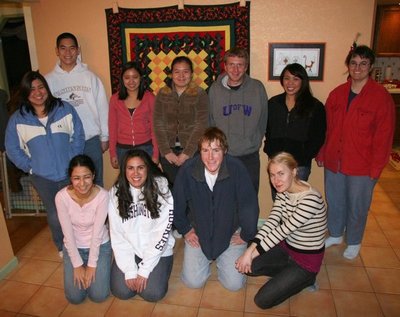January 18, 2007
Weathering the Storm: Students rebuild after Katrina
When Charlene Reyes landed in New Orleans a couple of weeks ago, it was her first time outside the three west-coast states. Since then, she’s encountered untold other firsts.
Reyes and 11 other undergraduate students have begun a quarter of study in Bay St. Louis, a Mississippi town of about 8,000 residents. They will spend winter quarter rebuilding houses and learning about technology, natural disasters and emergency response in a new course, “Impact of Katrina on Technology and Infrastructure.”
Electrical Engineering Associate Professor Denise Wilson hopes to combine the region’s need for semi-skilled labor with a unique teaching opportunity. The course was inspired by Wilson’s own life-altering experiences volunteering on the Gulf Coast. The first was in Thanksgiving 2005, just 10 weeks after Hurricane Katrina hit.
“I didn’t see that we could still go on as usual when there was such mass suffering going on in a region of the country,” she said. “Personally, my own life was changed by the Katrina experience.”
While media coverage after Hurricane Katrina focused on New Orleans, the Mississippi coastline was hit by the strongest winds and largest tidal surges. In December 2006 more than 90,000 Mississippians were still living in government trailers, according to news reports. Bay St. Louis was hit by 30-foot storm surges.
“You see houses that were totally demolished. And you see a new house right next to it,” Reyes said after her first day on the Gulf Coast. “You really see the [effects of the] relief effort.”
The gloves-on course will offer a decided contrast to campus classroom lectures. Students will work three days a week in construction — installing drywall, plumbing and even electrical wiring. By the end of the quarter, they will advance to training teams of volunteers. Most Katrina volunteers come for week-long stints organized through faith-based nonprofits or community groups.
Students will bunk in a dormitory and share meals in a Presbyterian church that now serves as a rebuilding center. Many are enrolled in the AmeriCorps national service program, which provides a scholarship for service effort. A shorter version of the course will be offered in August as a three-week Exploration Seminar.
Reyes, a junior electrical engineering student, recalls watching wistfully as friends who were arts majors embarked on European exchanges. “I thought ‘Oh, I’m never going to get that [opportunity] in my major,'” she said. The Bremerton native registered for Wilson’s course partly because she aspires to do engineering work in the Philippines, and hopes to prepare herself by living away from home.
Engineers traditionally have had few opportunities to study off-campus. But things may be changing. A UW chapter of Engineers Without Borders, dedicated to technical relief work, started in 2005. And individual professors like Wilson are taking the classroom material to a global context.
Wilson’s course was offered to all undergraduates. UW’s Carlson Center helped design the curriculum, integrating community work with classroom assignments and discussions. One of Wilson’s goals is to demonstrate the effects of weak infrastructure. “What we missed [in preparing for this storm] were the compounding factors — the wetland degradation, the limitations of leadership, the outdated power grids,” Wilson explained. Students will attend seminars and field trips, and they will write a technical paper addressing questions that Wilson sees as crucial for preventing a repeat scenario: Why did the entire state lose power? Why were so many people trapped? Why didn’t search-and-rescue teams reach people in time?
In preparing the course, Wilson vanquished administrative hurdles with help from the Office of International Programs and Exchanges. David Fenner, director of international programs and exchanges and assistant vice-provost for international education, said Wilson’s energy and vision suit her task. But a domestic study-abroad course poses logistical challenges.
“One of the things this program highlights is that while we have all the mechanisms set up to handle international programs, we don’t have an office set up to handle the national programs,” Fenner noted. Programs in the Arctic National Wildlife Refuge, Willapa Bay, Wash., and the Navajo Nation in the Southwest — and now the Mississippi coast — fall under the auspices of the international office by default. But faculty members are increasingly choosing to host courses or field trips in the United States, Fenner said.
Now that the anticipation is over, the classroom challenges begin. Wilson says she looks forward to teaching to a diverse range of students. “Part of my goal is to convince someone who’s a major in the comparative history of ideas that they can understand technology and its effects,” she said.
As for what she wants students to gain, Wilson said simply, “I hope students come away with a strong, enduring desire to serve their community.”



